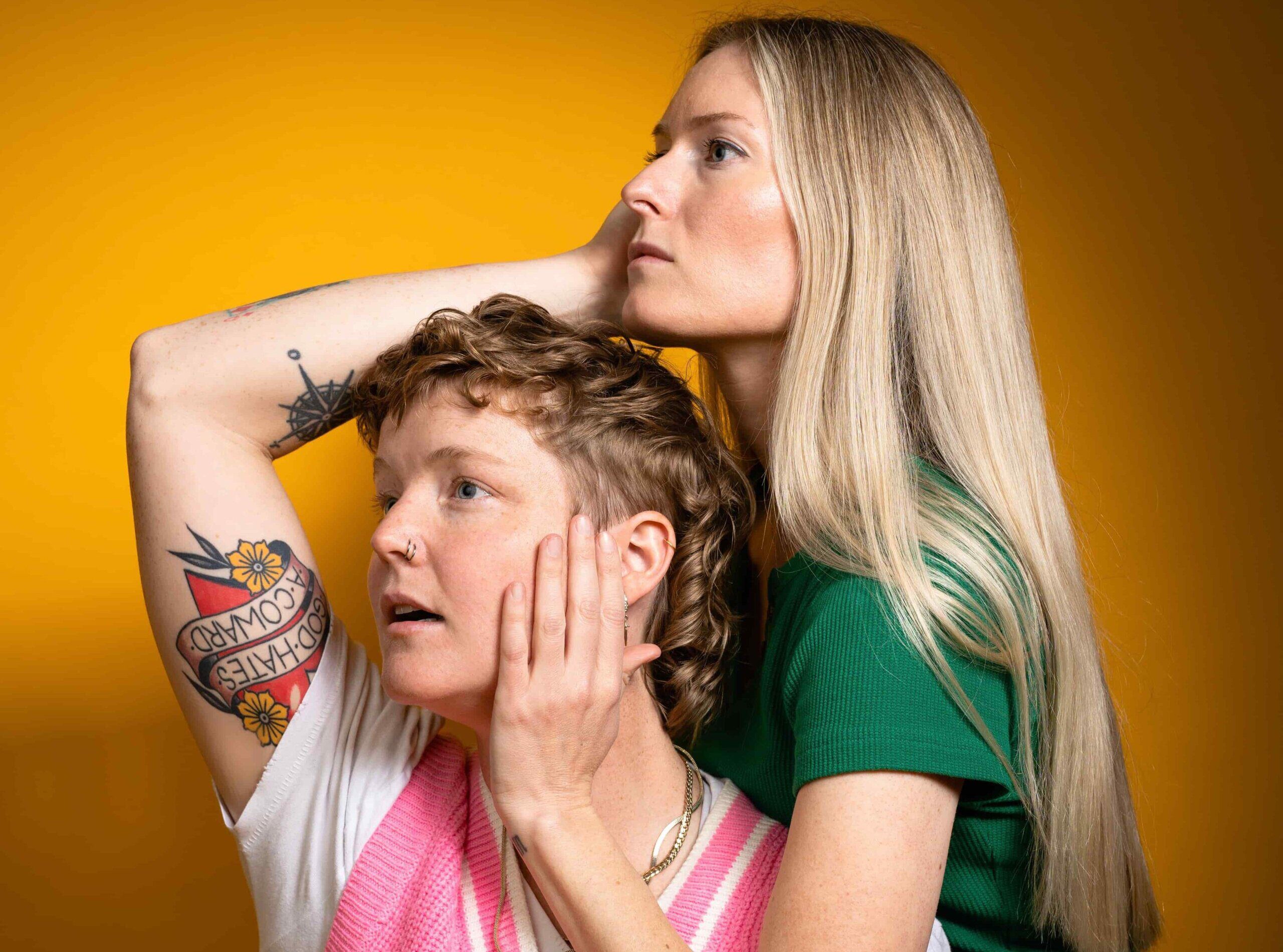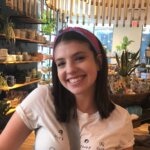Standup comedians Rachel Scanlon and McKenzie Goodwin have been hosting Two Dykes and a Mic, a queer, sex-positive comedy podcast, since 2017. Then, they were in their 20s and had more questions about gay sex and dating than they did answers. Now, after six years’ worth of episodes, they’ve taken their schtick on the road.
The weekly podcast—filled with real-life queer dating fumbles, in-depth pop-culture discussions about everything from The Ultimatum: Queer Love to middle-aged actresses, and interviews with LGBTQ2S+ icons like Mae Martin and Margaret Cho—has grown and matured alongside its hosts over the years, answering the burning questions queer women rarely get to ask, while providing listeners with plenty of belly laughs along the way. Their unfiltered stories, palpable comedic chemistry and beloved segments—including Gay News (where they discuss any and all news that’s even remotely queer), Ask a Dyke (where they provide queer relationship advice) and Who Tops Who? (a serious discussion about who would top who, about everyone from beloved cartoon characters to horror movie villains)—have become a bona fide cultural phenomenon, and fans of the podcast are finally getting to experience the (genuinely platonic, I’m assured) lesbian best friends’ signature banter IRL.
The duo has been touring across the U.S. since January, with the current leg of the tour officially kicking off at the beginning of August. Come September, they’ll be stopping in Calgary, Vancouver, Edmonton and Toronto for their first-ever Canadian shows.
I spoke to Scanlon and Goodwin about what the tour has been like so far, the joys of working with your best friend and why comedy for queer women is essential.
What’s it like getting to perform for a big room of queer folks every night?
Goodwin: It’s magical. I’ve never been in a room of that many queer people night after night. It feels like we’re truly building a community in every city that we go to.
Scanlon: It feels like you’re at a family reunion, a kickback, where there is a common language. You don’t have to explain everything. And when there are that many queer people around, you can explore so much more within who you are, comedically, because they’re all in on the joke. I feel like being at a Two Dykes and a Mic show is like snorting queer joy.
How different is the live show from the podcast?
Goodwin: Because we’ve been doing this for so long, we do things the same way on the stage as we do on the podcast. When we record by ourselves, we’re always looking at each other, doing a lot of inside jokes. And when you put us on stage, it’s the exact same thing, but with a lot more audience interaction.
Scalon: At our shows, audience members are basically welcomed into the world that we’ve already created in the studio. Because we both have years of experience doing standup, and we have this podcast that people are listening to, it just made perfect sense to tour it live. And we’re comedians, so we want to hear laughs. It feels good.
Tell me about a highlight that stands out to you from the tour so far.
Scanlon: We were in a city in Texas and we were doing a live version of our Bumble Fumble segment [a segment on the podcast where listeners submit stories of their most embarrassing, cringeworthy dating-app experiences], and this girl in the front row gets up and describes being horribly ghosted multiple times by the same person. So they would match, then she would get ghosted, match again, ghosted again. And then at the end she goes, “And that person is sitting two rows behind me.” The whole crowd started yelling and it became like a gay Maury situation very quickly.
Goodwin: It was iconic.
In a recent podcast episode, you spoke about the need for community gathering places/third spaces and how people in search of that can find it at your show. Why is that so important for queer folks specifically?
Scanlon: A big part of the queer experience, for so many of us, can be that isolation of being the only queer person in your family or the only queer person in your friend group. And we all know that fire you feel when you see another queer person in public, when you see another lesbian couple holding hands and you’re just like, “Why am I tap-dancing right now?” Any type of marginalized community knows that feeling when you see other people like you and you can connect with them. And often for queer people now, that only happens on the internet. So I think it’s really important to make that leap into real life.
Goodwin: As a part of our show, we say “Everybody who’s single, raise your hand and look around.” I think there are a lot of queer people who don’t know how to ask each other out, or how to make queer friends. So we really like to see that our show is such a queer coming together. We want people to meet people in their community who are gay.
Why does the world need comedy that is specifically for and about queer women?
Scanlon: When I was coming out, all I wanted to do was be in queer spaces, but the spaces I found all had this kind of sensual, serious energy. I’m not a serious lesbian, and I’ve never been a serious lesbian. All I ever wanted my whole young queer life was to be with queer people and be silly. All we want to do is laugh with our gay friends. If you know queer women, you know that we are the funniest, most lively, most caring people that you’ll ever get to meet. I always wanted to see that represented. We just want to let lesbians laugh.
One of the main things you do is provide sex and relationship advice that is specific to queer women. Why do you think talking so candidly about the gory details of gay dating and sex is so necessary?
Goodwin: There are a lot of people who don’t have a queer best friend to ask those questions to. So I think we’re starting conversations that genuinely are like, “Wait, how do you go on a first date with a woman? How do you talk to women?” It’s nice to hear two gay best friends telling you how to do it.
Scanlon: I’ve always wanted to discuss these things. And we’ve been doing this podcast for so long that you actually will hear us going through different phases of the queer dating experience throughout. We’ve gone from our young 20s, slutting around, to having long-distance relationships, letter-writing, dating on the apps. McKenzie is getting married in a few weeks, and she’s going to want to start a family. So we kind of grew through the podcast. Plus it’s just so much fun. I mean, who doesn’t want to hear two queer people talking about sex?
What’s it like getting to do this with your best friend?
Goodwin: Oh my god, it is honestly the dream. As women in comedy, touring can be very dicey sometimes. And you’re put in uncomfortable situations. So to be able to get back to our hotel after a long day of doing weird stuff and decompress with each other, laughing all night long—it’s like summer camp every single night.
Scanlon: Our routine is so cute. We go back to our hotel, we each get in our twin-size beds, we pull up the covers like we’re Grandma and Grandpa from Charlie and the Chocolate Factory. We put in our AirPods and call our girlfriends, we go, “Oh my god, I love you, I love you,” we put our phones down, and then we just laugh and laugh and laugh and then we go to sleep very early.
What has surprised you about the tour so far?
Scanlon: We’ve been to so many different cities that I’ve never been to, and I typically wouldn’t think of these places as having such a strong, incredible queer community. Realizing that queer people are truly everywhere has been really fun.
Goodwin: We went to Springfield, Missouri, where you wouldn’t expect there to be a big community, and we packed that room. And it was very cool for the audience to be able to look around and be like, “Oh my god, I’m not the only one in Springfield, Missouri, who’s queer.”
Scanlon: A lot of times when we’re going to these different cities, we’re performing in classic comedy clubs. And so many of those people that come to our shows have never stepped foot in a comedy club because, and I think that we can all attest to this, there is a very straight male vibe. So it feels almost like getting to take over the world in a queer, funny, silly, positive way. To make queer people laugh in the straightest of places is pure joy to me.
In three words, what can people expect from your live show?
Goodwin: Sexy, funny, gay.
Scalon: Slippery, hysterical and deeply queer.
Goodwin: You’re just doing synonyms of the exact ones I did.
Scanlon: You bring the bones, I fill out the tree, baby.
This interview has been edited for length and clarity.


 Why you can trust Xtra
Why you can trust Xtra


